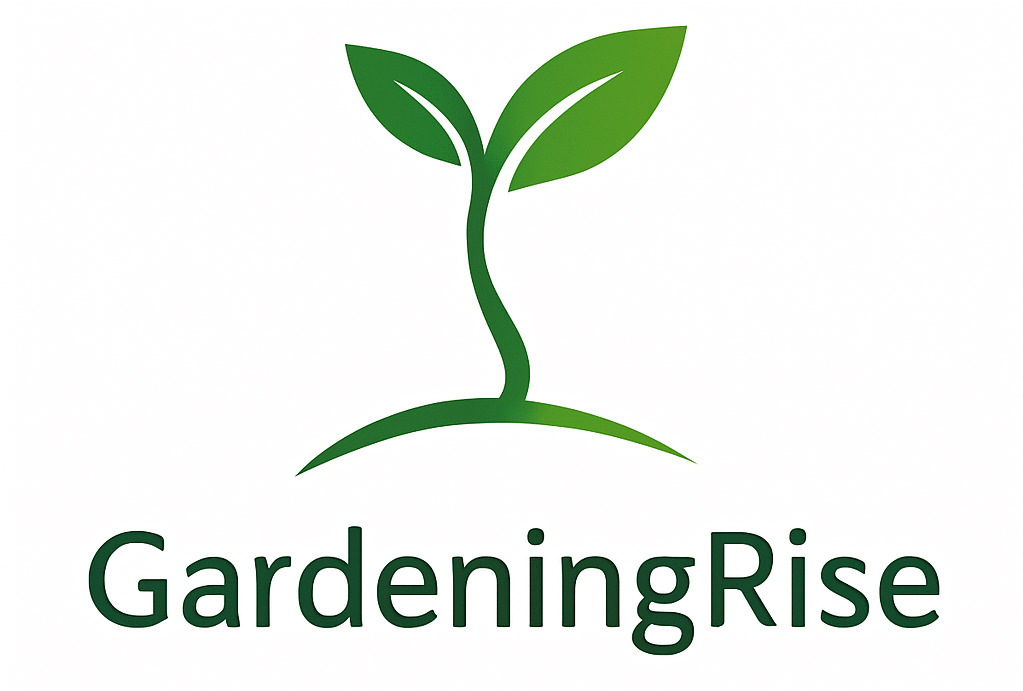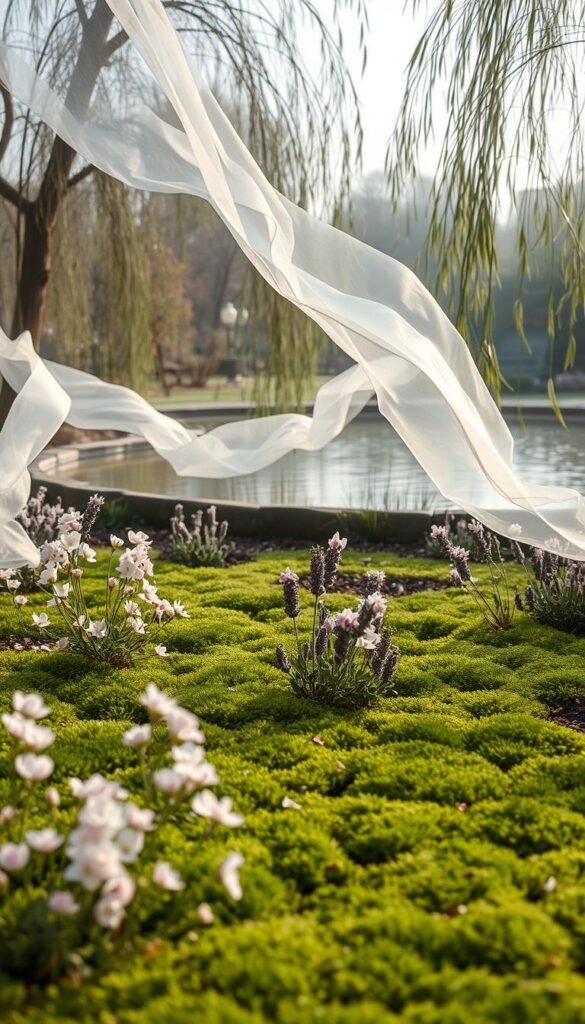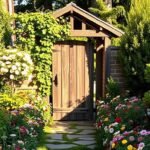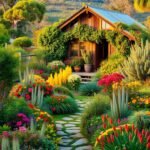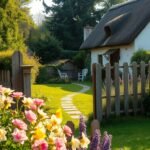Imagine stepping into a space where muted tones dance with sunlight, where every breeze carries floral whispers. This design philosophy blends modern trends with nature-inspired elegance, offering more than visual pleasure—it creates emotional sanctuaries that soothe the soul.
You’ll discover how to craft areas that feel both fresh and nostalgic. Think airy textiles swaying between flower beds or watercolor-inspired plant combinations that shift with the seasons. These elements work together to build environments that naturally ease stress while sparking joy.
Our guide walks through selecting hues proven to boost calmness, like creamy whites and lavender mists. We’ll show you how to layer textures using lightweight materials that catch sunlight without overwhelming delicate blossoms. For inspiration, explore how the cottagecore movement blends practicality with enchantment.
Learn to choose plants that thrive year-round while maintaining whimsy. From early-blooming peonies to frost-resistant pansies, smart planning keeps your retreat vibrant through changing weather. Whether you’re refreshing a balcony or redesigning a backyard, these principles adapt to any size with magical results.
Discover Your Soft Garden Aesthetic Journey
Picture a sanctuary where hues whisper tranquility and textures invite calm. This journey begins by embracing lightness in design—not just visually, but through every sensory detail that shapes your outdoor retreat.
Understanding the Essence of Softness and Serenity
Muted tones like blush pinks and powdery blues do more than please the eye. Studies show these shades lower heart rates by 12% compared to brighter colors. Their historical roots trace back to 18th-century watercolor art, now reimagined for modern green spaces.
True serenity comes through layered experiences. Imagine:
- Crunching gravel paths underfoot
- Honey-scented sweet peas on summer evenings
- Bamboo wind chimes creating nature’s playlist
How Personal Style Transforms Spaces
Your wardrobe choices often reveal ideal garden elements. Flowy dresses might inspire billowy curtains between trees, while favorite artwork could spark vision board ideas for plant arrangements.
Start by observing patterns in your living room decor or cherished accessories. These clues help create outdoor areas that feel like natural extensions of your personality. For practical steps, explore space-enhancing techniques that balance beauty with easy upkeep.
Remember—your garden should mirror what makes your heart feel light. Whether through vintage teacup planters or cloud-like seating nooks, let your spirit guide the transformation.
Essential Elements for Creating a Pastel Garden
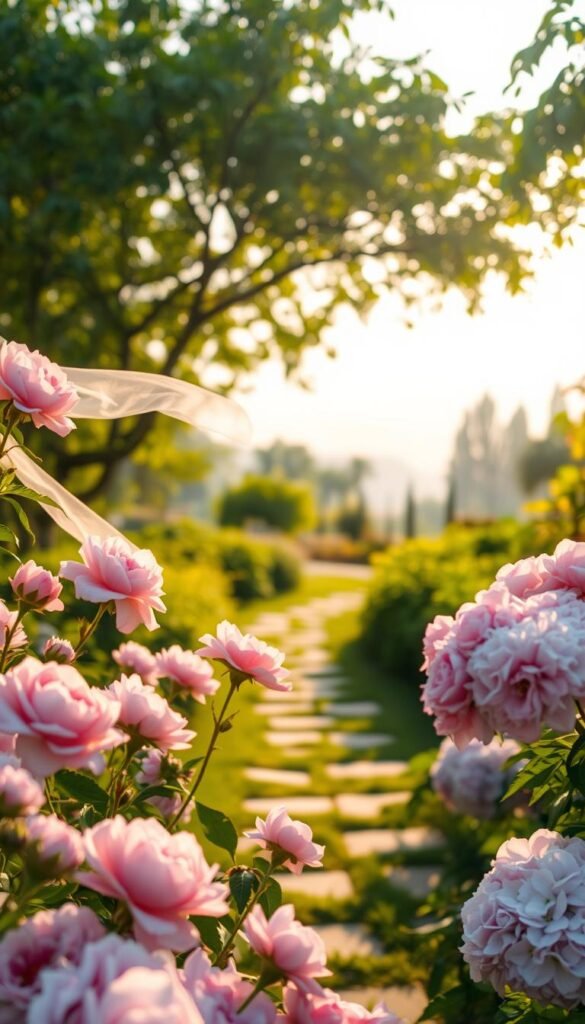
Envision a canvas where every hue feels like a whispered secret and textures float like morning mist. Building this dream requires two key components: a thoughtfully curated color story and strategic use of translucent materials that complement living botanicals.
Mastering Chromatic Harmony
Start by choosing three base tones from the same temperature family. A popular combination pairs:
| Primary | Secondary | Accent |
|---|---|---|
| Powder blue | Dusty rose | Buttercream |
| Lavender | Peach | Mint |
| Pale lilac | Seafoam | Blush |
Hydrangeas offer four-season interest with their evolving shades, while tulips provide bold shapes in gentle tones. For shaded areas, try Astilbe ‘Bridal Veil’—its feathery plumes glow in moonlight.
Translucent Textures Meet Living Petals
Sheer drapery transforms functional structures into artistic statements. Consider these pairings:
- Pergola curtains: Opt for UV-resistant polyester voile that moves like silk
- Plant supports: Use lace-patterned netting for climbing sweet peas
- Privacy screens: Layer organza panels between flowering shrubs
Position fabric elements where they’ll catch afternoon light without blocking plant growth. Rotate materials seasonally—lighter linens for spring, slightly heavier chiffons in autumn. Remember: your textiles should whisper, not shout, alongside nature’s artistry.
How-To Guide: Integrating Pastel Colors into Your Garden
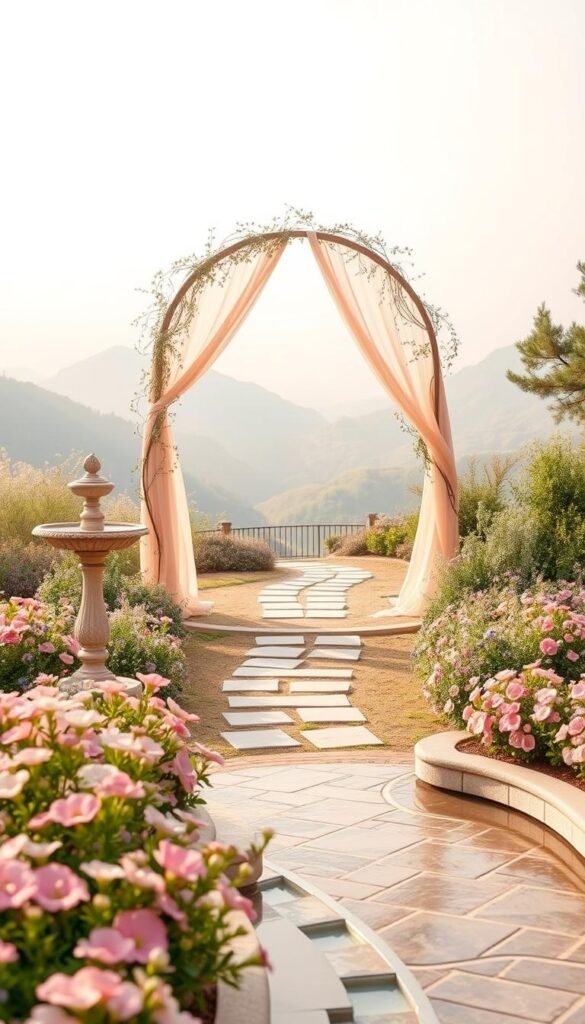
Crafting a garden with delicate hues feels like painting with nature’s palette. Start by mapping sunlight patterns and soil types in your space—this determines which flowers will thrive. Successful designs balance dreamy tones with structural elements that ground the ethereal vibe.
Step-by-Step Planning for Your Garden Layout
Begin with a seasonal color roadmap. Track how morning light shifts across your space through spring and summer. Use this table to plan year-round visual flow:
| Season | Primary Hue | Supporting Tones |
|---|---|---|
| Spring | Lemon chiffon | Mauve, pearl white |
| Summer | Seafoam | Blush, sage |
| Autumn | Dusty rose | Terracotta, wheat |
| Winter | Icy blue | Silver, evergreen |
Sketch plant placements using the thriller-filler-spiller method. Tall foxgloves (thriller) pair with trailing lobelia (spiller) and compact violas (filler). This creates depth while maintaining airy designs.
Tips for Mixing Pastels with Bold Natural Elements
Anchor wispy blooms with textured foliage. Dark-leaved heuchera makes candy pink peonies pop, while charcoal stepping stones highlight pale blue forget-me-nots. For container gardens, pair cement planters with frothy baby’s breath.
Remember:
- Use evergreen shrubs as living frames
- Add drama with one burgundy focal plant per bed
- Incorporate stone pathways to prevent washed-out effects
Time plantings so new buds emerge as others fade. Early spring crocuses give way to summer phlox, ensuring continuous color without overwhelming the senses.
Soft Garden Aesthetic: Pastel Colors, Sheer Fabrics, and Gentle Blooms in Action
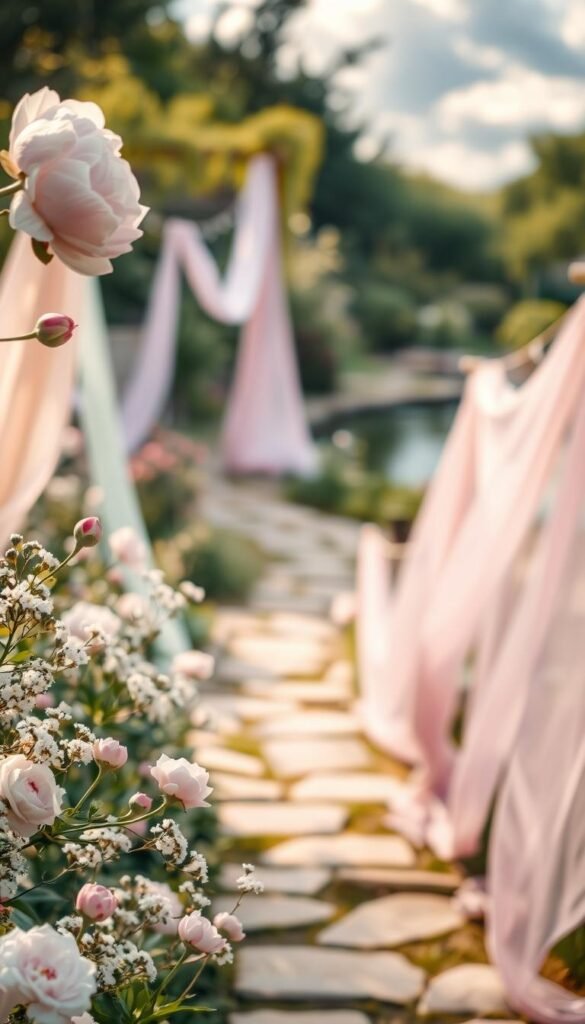
Visualize a twilight scene where muted pinks blend with fading sunlight, creating living art that breathes. These real-world spaces prove delicate palettes thrive beyond mood boards—they transform ordinary yards into storybook escapes.
Real-Life Inspirations and Design Examples
New York designer Marisa Cole turned a 200-square-foot balcony into a powder-blue retreat using:
- Draped tulle panels that flutter like butterfly wings
- Self-watering planters with blush-toned begonias
- Reflective gazing balls doubling moonlight
Texas homeowners transformed their backyard with a “living watercolor” approach. Their secret? Mixing matte-finish furniture with glossy-leafed camellias. “We wanted our arrangements to feel discovered, not designed,” they shared during our interview.
| Space Type | Key Feature | Maintenance Tip |
|---|---|---|
| Urban balcony | Vertical herb wall in sage tones | Use drip irrigation for consistent moisture |
| Suburban yard | Meandering gravel paths | Edge beds with recycled glass mulch |
| Country estate | Orchard underplanted with lavender | Prune for air circulation |
Seasonal photography reveals how these designs evolve. Spring’s candy-tuft carpets give way to summer’s frothy gypsophila clouds, maintaining charm through frosty mornings. Pro tip: Interplant early bulbs with late bloomers for seamless transitions.
Looking to adapt these ideas? Start small—line walkways with solar-powered pebble lights or hang lace-patterned wind catchers. Your space should whisper your story through every thoughtful touch.
Seasonal Flower Recommendations for a Whimsical Garden
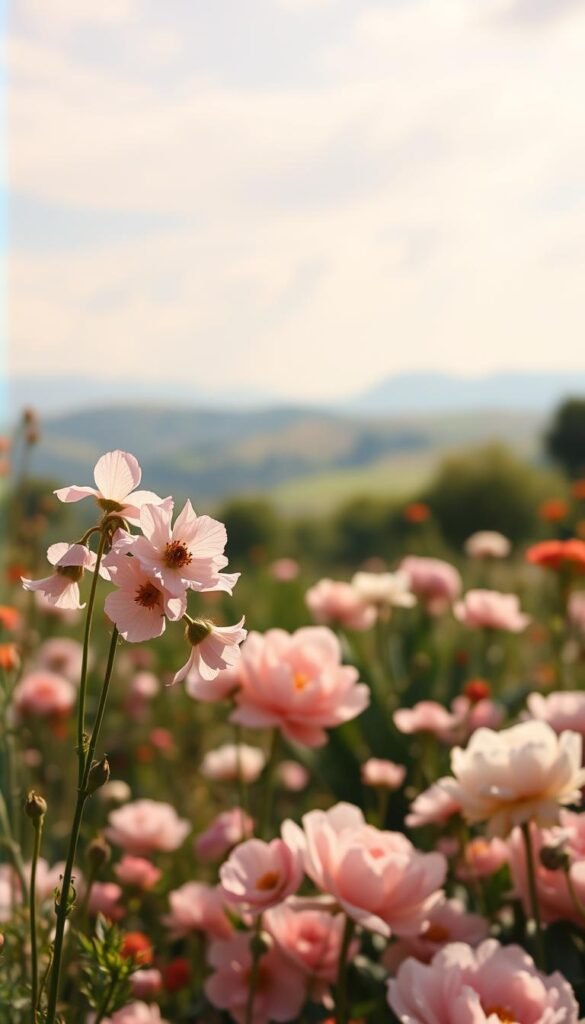
Transform your outdoor space into a year-round retreat with blooms that shift like the seasons. Timing your plantings ensures a cascade of color from first thaw to frost, creating living art that evolves monthly.
Spring Blooms and Early Pastel Inspirations
Kickstart your floral arrangements with tulips emerging in blush and buttercream shades. Pair them with fragrant lilacs for vertical interest, planting bulbs in late fall for April surprises. Cherry blossoms thrive in well-drained soil, their petals creating natural confetti for pathways.
| Season | Flower Recommendations | Planting Tips |
|---|---|---|
| Spring | Tulips, Lilacs, Cherry Blossoms | Plant bulbs 6 weeks before frost; mulch lightly |
| Summer | Peonies, Cosmos, Lavender | Sow seeds after last frost; space 12″ apart |
| Autumn | Chrysanthemums, Asters, Anemones | Transplant in early summer; stake tall varieties |
| Winter | Hellebores, Winter Jasmine | Plant in sheltered areas; water sparingly |
Extending the Look Through Cooler Months
Summer’s lavender spikes blend seamlessly into autumn’s mauve chrysanthemums when staggered properly. For winter interest, hellebores offer rose-like blooms that push through snow. Low-maintenance flowers like cosmos keep beds lively without constant care.
Rotate plantings every 8 weeks for continuous fresh flowers. Deadhead spent peonies to encourage second blooms, and wrap delicate stems before first freeze. Your garden’s essence—spring’s hopeful beginnings to winter’s quiet beauty—will captivate through every season.
Choosing the Perfect Accessories for a Dreamy Garden
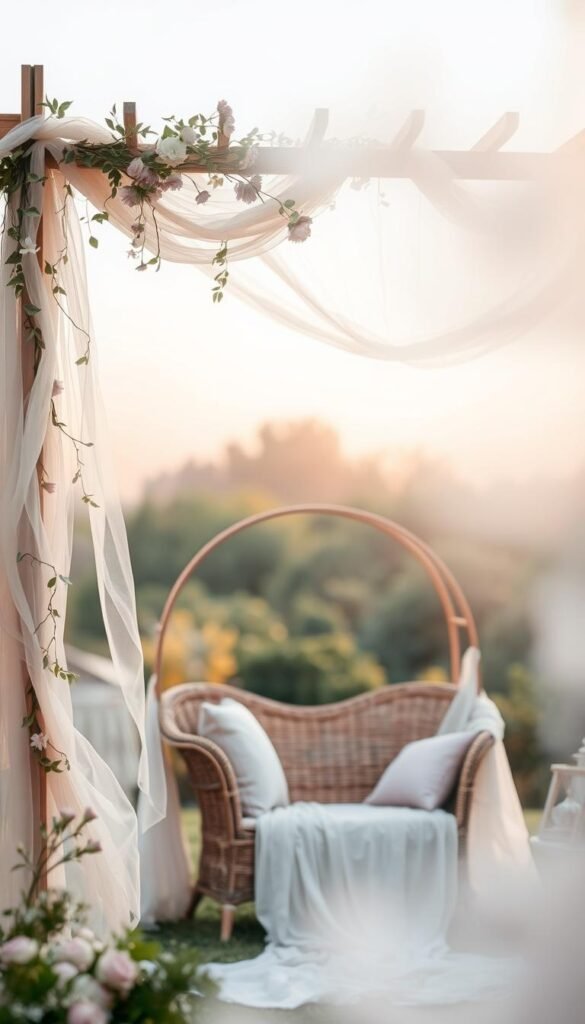
Twilight transforms gardens into enchanted realms when curated accents work their magic. The right accessories elevate your space from lovely to unforgettable, blending practicality with ethereal charm that dances between daylight and moonlight.
Fairy Lights, Lanterns, and Reflective Features
String lights become nature’s jewelry when woven through climbing roses or draped along pergolas. Opt for warm-white LEDs with adjustable brightness—they cast flattering glows on delicate petals without washing out their hues. For lanterns, choose powder-coated metal designs that resist rust while echoing your color story.
Mirrors multiply beauty when angled behind flower beds. Place them to reflect sunset skies or double the impact of your favorite hydrangea cluster. A well-positioned gazing ball adds playful mystery, its curved surface distorting blooms into abstract art.
- Secure wind chimes in breezy spots using nylon cords
- Choose glass bird sculptures that shimmer in low light
- Install solar-powered path lights disguised as mushrooms
Maintain balance by limiting decorative pieces to three focal areas. Clean fixtures monthly with vinegar solutions to prevent mineral buildup. Your evening ambiance should feel effortless—like fireflies decided to stay for dinner.
Creating a Serene Outdoor Retreat with Natural Elements
What if your backyard could become a peaceful escape that feels miles away from daily life? By blending functional elements with earth-friendly materials, you’ll craft a personal haven that harmonizes with the surrounding rhythms of nature.
Water’s Calming Influence
A compact fountain adds gentle movement to your space, its trickling sounds masking neighborhood noise. Position it near seating areas where water reflections dance across nearby foliage. Solar-powered models work beautifully in sunny spots, requiring no electrical setup.
Bird baths serve dual purposes—they create visual interest while supporting local wildlife. Choose shallow designs with textured bottoms for safer perching. Place them where you can watch sparrows splash from your window.
Furniture That Belongs
Select pieces that enhance your atmosphere without dominating it. Weather-resistant teak benches age gracefully, while powder-coated metal chairs in muted greens blend into plantings. Add throw pillows in cloud-like shapes for comfort that matches your airy theme.
Arrange seating to highlight your favorite views—a blooming dogwood or winding herb spiral. Leave pathways wide enough for meandering, letting your space invite exploration. With thoughtful placement, every chair becomes a front-row seat to nature’s quiet drama.
These natural elements work together to craft an outdoor world that feels both intentional and effortless. As dusk falls, your retreat whispers promises of tomorrow’s peace—one ripple, one breeze, one deep breath at a time.
